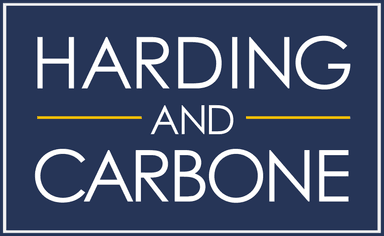How Disabled Veterans Can Receive A Property Tax Exemption In Texas
October 8, 2025

Key Takeaways:
- Eligibility: Disabled veterans in Texas can reduce or eliminate property taxes based on VA disability ratings.
- Survivor Benefits: Spouses may continue receiving exemptions if specific residency and marital requirements are met.
- Documentation and Filing: Correct forms, proof of service, and timely applications are required for approval and long-term savings.
Property taxes can feel overwhelming for many Texas homeowners, and disabled veterans often face additional challenges when navigating the system. Fortunately, Texas law provides meaningful exemptions that reduce or even eliminate property tax obligations for qualifying veterans and their families. These exemptions offer real financial relief and protect long-term stability by lowering the taxable value of a home.
At Harding & Carbone, we have been serving Texas property owners for over 40 years, helping thousands of clients successfully manage property tax matters. Our experience extends across the state, and we take pride in simplifying complex processes so veterans and their families can secure the benefits they have earned. With a proven record of results, Harding & Carbone continues to be a trusted name in property tax reduction.
Service-Connected Disability Ratings And Tax Savings
Disabled veterans in Texas have access to property tax exemptions that directly reduce the taxable value of their homes. These exemptions are tied to the veteran’s disability rating, which is determined by the U.S. Department of Veterans Affairs (VA). To better understand how these exemptions work and what they mean for your finances, let’s look at the details:
How Disability Ratings Affect Your Exemption
The VA assigns disability ratings in 10% increments, starting at 10% and going up to 100%. Texas uses these ratings to determine the exemption amount you can claim on your primary residence. For example, veterans rated between 10% and 29% receive a $5,000 exemption, while those rated at 100% are fully exempt from property taxes.
Connection Between Property Taxes And Mortgages
Many Texas homeowners pay their property taxes through an escrow account that is included in their mortgage payment. When a disabled veteran receives an exemption, the taxable value of their home decreases, which can lower the property tax bill. Over time, this reduction may also decrease the mortgage payment tied to escrow, and Harding & Carbone can guide you through the process with tailored services that simplify these important adjustments.
Updating Your Disability Rating
If your VA disability rating changes, you may qualify for a larger exemption in the following tax year. To receive the updated benefit, it is essential to submit the revised VA award letter to your county appraisal district as soon as possible. Prompt submission ensures the correct exemption level is applied without delay.
Surviving Spouse Benefits And Rules
Texas extends property tax exemption benefits to surviving spouses of disabled veterans. These provisions are designed to protect families after the loss of a loved one who served and ensure financial stability through continued tax relief. To qualify, certain requirements must be met, and understanding these rules is key:

Marriage Status
A surviving spouse must have been legally married to the veteran at the time of the veteran’s passing. Without proof of marriage, exemption eligibility cannot be transferred.
Residence Requirement
The surviving spouse must continue to occupy the home as their principal residence. The exemption applies only to the property that remains their primary home and does not extend to additional properties.
No Remarriage Rule
Exemption eligibility continues only if the surviving spouse does not remarry. If remarriage occurs, the property tax exemption typically ends, and the county appraisal district will adjust records accordingly.
Amount Of The Exemption
The surviving spouse generally inherits the same exemption percentage or amount the veteran received. For example, if a veteran had a 100% disability rating, the surviving spouse may continue to receive a full exemption from property taxes. Partial exemptions, such as those based on 30%, 50%, or 70% disability ratings, are also transferred under the same conditions, and Harding & Carbone can provide step-by-step support through the contact page to help ensure applications and documents are submitted correctly.
Required Forms: 50-114 And 50-135 Walk-Through
Applying for a disabled veteran property tax exemption in Texas involves completing two important forms. Each form has a specific purpose, and accuracy is essential for approval. Here is what you need to know about both applications:

Form 50-114: Application For Residence Homestead Exemption
This form establishes your property as a homestead, which is a required step for most property tax exemptions. To complete it, you will need the property’s legal description, proof of ownership, and a Texas driver’s license or state ID that matches the property address. Double-check that the name on the form matches your ownership documents to avoid delays.
Form 50-135: Disabled Veteran Or Survivor Exemption Application
Form 50-135 is specifically for veterans and surviving spouses or children seeking the exemption. Applicants must provide a current VA disability letter, along with property details and proof of relationship for survivors. The exemption level you select must match the VA rating shown in your documentation. Harding & Carbone assists homeowners with these forms, and our services are designed to simplify the process of preparing and submitting them correctly the first time.
Submitting Your Forms
Completed forms are submitted to the county appraisal district where the property is located. Some counties allow in-person delivery, while others require mailing the documents. Always keep a copy for your records and follow up with the appraisal district if you do not receive a response within a few weeks.
Important Deadlines For Filing Applications
Filing deadlines play a critical role in securing the disabled veteran property tax exemption. Missing these dates can delay or even prevent approval, which makes careful planning essential. Below are the key timelines to keep in mind:
Standard Deadline
The official deadline for submitting your application is April 30 of the tax year in which you want the exemption to apply. Submitting your paperwork by this date keeps your application on track and prevents unnecessary complications with your appraisal district.
Late Applications
Texas law provides flexibility by allowing late applications up to two years after the delinquency date. While this option exists, late filing requires additional documentation and explanations, which can make the process more challenging.
Why Timeliness Matters
Meeting deadlines ensures that your exemption is applied promptly and that your property tax bill reflects the savings you are entitled to. Harding & Carbone has worked with countless Texas homeowners to stay on schedule, and our contact page provides direct access to assistance when important filing dates are approaching.
Gathering Military And Medical Documentation
Supporting documents are the foundation of a successful exemption application. County appraisal districts require clear and complete records to verify eligibility, and missing or unclear information can cause delays. To keep the process smooth, prepare these documents in advance:
Proof Of Service
Begin with your DD214 or other official discharge papers. This record confirms your branch, dates of service, and discharge status. A clean, legible copy is essential to prevent slowdowns in the review process.
VA Disability Award Letter
Your VA disability letter is critical because it shows your current service-connected rating. Since exemption amounts are tied directly to this rating, always request an updated letter if your rating has changed before filing.
Medical Documentation For Accessibility Modifications
If your home has accessibility changes linked to your condition, include short medical notes explaining why they are needed. Examples include wheelchair ramps, widened doorways, or other service-related home modifications.
Organizing Your Packet
Arrange your documents in order, starting with the DD214, followed by the VA disability letter, medical notes, and any county-specific forms. Label each section with your property address and name to reduce confusion. Harding & Carbone reviews documentation regularly for homeowners across Texas, and our services help ensure your packet is accurate and ready for submission.
Combining Disabled Veteran And Other Homestead Exemptions
Texas law allows different property tax exemptions to be combined, creating even greater savings for homeowners. Disabled veterans and their families often benefit from stacking exemptions, since each one applies in a unique way to reduce the taxable value of a home. Understanding how these exemptions interact can make a meaningful difference:
Standard Homestead Exemption
The standard homestead exemption lowers the taxable value of a primary residence for school district taxes. For instance, a home appraised at $250,000 may see a $40,000 reduction, bringing the taxable value down to $210,000.
Disabled Veteran Exemption
This exemption subtracts an additional amount from the home’s value based on the veteran’s disability rating. A veteran with a 30% to 49% disability rating could see about $12,000 in further reductions, which lowers the taxable value even more.

Senior And Surviving Spouse Exemptions
Seniors and surviving spouses of qualifying veterans may qualify for further reductions. These savings are added on top of existing exemptions, creating a layered effect that helps families manage property taxes more effectively. Harding & Carbone works directly with homeowners to identify all exemptions they qualify for, and our contact page is the best way to start the process of combining them correctly.
Final Thoughts
For disabled veterans and their families in Texas, property tax exemptions provide meaningful relief by reducing financial strain and protecting the stability of their homes. While the process requires documentation and attention to deadlines, the long-term savings can make a significant difference. Harding & Carbone has decades of experience in Texas property tax matters, and through our main site, you can learn more about how these exemptions work and find resources to help you move forward confidently.
Read Also:
- Fort Bend County Taxes: Essential Facts And Payment Steps
- Property Tax Advice For Montgomery County Homeowners
- Brazoria County Taxes: A Guide To Rates, Exemptions, And Due Dates
Frequently Asked Questions About Are Property Taxes Included In Mortgage
Are property taxes included in mortgage payments for veterans with exemptions?
Yes, property taxes are often included in mortgage escrow payments, but once an exemption is applied, the reduced amount will be reflected in future escrow adjustments, potentially lowering monthly payments.
Can a veteran use the property tax exemption on rental properties?
No, the exemption applies only to the veteran’s primary residence. Rental properties or secondary homes are not eligible.
Does the exemption apply to land or only the house itself?
The exemption generally applies to the entire property designated as the veteran’s primary residence, which includes both the house and the land it sits on.
What happens if a veteran refinances their mortgage?
If a veteran refinances, the exemption remains in place as long as the property is still their principal residence. The new mortgage lender may need updated appraisal district records.
Can a veteran transfer the exemption to another county in Texas?
Yes, exemptions are transferable across Texas counties. Veterans must reapply with their new county appraisal district and provide required documentation.
Are there special exemptions for veterans who own multiple properties?
No, exemptions are limited to the veteran’s primary residence. Additional properties, such as vacation homes, do not qualify for this benefit.
Do veterans need to notify their mortgage company after approval?
It is helpful to notify the mortgage company once an exemption is granted. This ensures escrow accounts are updated to reflect the reduced property tax bill.
Can a veteran apply for an exemption if they are still on active duty?
Only veterans with an official VA disability rating qualify for this exemption. Active-duty service members without a VA rating are not eligible.
Does the exemption affect resale value of the home?
The exemption reduces annual tax obligations but does not impact the market resale value of the home. Buyers will not inherit the exemption unless they also qualify.
How long does it take for the exemption to show on a tax bill?
Once approved, exemptions typically appear on the next property tax statement. Processing time varies by county but usually takes a few weeks to a few months.
